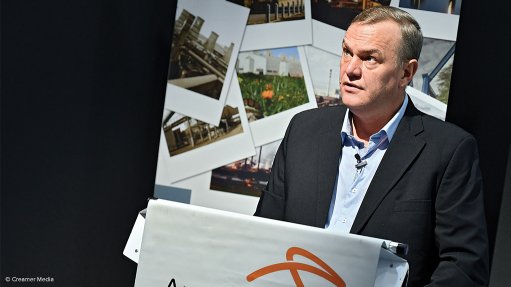BLSA CEO calls on govt to honour commitments in public-private partnership
Business Leadership South Africa (BLSA) CEO Busisiwe Mavuso has stressed the importance of the commitment made by government in June to support the agreed collaboration between the State and organised business.
Speaking to broadcast and financial journalist Alishia Seckam during a July 11 webinar hosted as part of financial services group PSG’s Think Big Series, she also discussed the importance of the three immediate priority interventions that were agreed upon. This includes energy, transport and logistics, as well as crime and corruption.
“This was the first meeting we had as business and government to give President Cyril Ramaphosa feedback on what has happened with the three priority interventions and the agreement that these are the three focus areas that we want to address.
“The President has given us his commitment that he is going to hold his Ministers and the rest of government accountable to make sure they support this initiative. We have committed to them that we're going to bring resources, we're going to bring in the skills, are going to bring in capability, and also are going to bring our time.”
Mavuso added that the private sector and business leaders would also make an effort to speak out and hold government accountable and that this partnership would help both government and the private sector keep each other accountable.
“This means we can try get government to understand the implications of their decisions. We sit in boardrooms and engage with investors, and we also conduct investment, so we have an obligation to make government understand what the international community is saying.”
She also raised concerns about minimal foreign direct investment currently being made into South Africa, as investors might look elsewhere if economic challenges in South Africa were not addressed.
PUBLIC-PRIVATE PARTNERSHIP
The work done by this partnership will be directed through a number of government-led initiatives.
This includes the National Energy Crisis Committee (Necom), the National Logistics Crisis Committee (NLCC) and the Joint Initiative to Fight Crime and Corruption, and will be overseen by a Joint Strategic Operations Committee.
“We are looking at a credible plan that is funded by business, in as far as, for instance, raising the R100-million for the Resource Mobilisation Fund (RMF). We launched the RMF in June, and it has been set up to make sure we can capacitate Necom.
“Ramaphosa spoke in July 2022 about the electricity crisis plan which has five interventions. Unfortunately, there aren’t necessary available resources to deliver this plan. So business has taken it upon itself to set up the RMF, which is also going to make sure we get the necessary skills to help government implement this plan”.
She also noted that, with regard to the three priority interventions, a rigorous analytical process has already been conducted to identify immediate priorities in all three of these sectors.
In terms of the energy crisis, Mavuso said organised business had four objectives to achieve. This included unlocking rapid generation capacity, improving the energy availability factor of Eskom, rapidly scaling residential and commercial rooftop solar technologies, and lastly fast-tracking gas-to-power.
“One of the things that we've identified for concern is that we're taking the four worst-performing power stations of Eskom, and we're going to send in the private sector capacity, such as engineers, to see if we can improve those power stations.
“It’s tangible, and timelines have been attached to it. We're confident that if government holds up its end of the bargain, and they allow the private sector to do what it's supposed to do and they collaborate with us as was promised, we should be able to deliver on everything we’ve set up.”
She stressed that, for the investor and business community, the local operating environment has deteriorated to its “weakest level”.
If challenges around the three priority interventions are addressed and improved, this would provide a “shift on 80% of the creation of a conducive environment”, she added.
“The litmus test for our efforts, and for the intervention that we're putting in place, is going to be making sure that we get investment. The President stated at the State of the Nation Address in February this year that government is trying to attract R2-trillion worth of investment into South Africa by 2028.
“We, therefore, need to answer the question, is our environment conducive for investment, because at the moment we are losing a lot of investment to East Africa and other African countries. We are actually no longer the destination of choice.”
REGULAR INTERFACING
Mavuso explained that this partnership would involve regular interfacing between relevant public officials and government departments and the private sector.
“We have assumed the core model we had during the Covid-19 pandemic. When we set up Business for South Africa during Covid-19, it was business and government co-sharing these workstreams and making sure that the solutions that were put on the table were resolutions that were co-created.
“If there's something that is not going to be practical about the solutions that are proposed by business, then because government is involved, they'll be able to tell us what the difficulty might be for government to be able to make sure the plan can work. This is the nature of this co-creation exercise.”
She enthused that this “co-creative approach” was beneficial for South Africa’s approach to the Covid-19 pandemic, particularly in providing vaccinations, and that if this same model was fully used now it could provide similar benefits.
“We are currently setting up the NLCC. Companies that are importing and exporting goods in and out of the country will note the difficulties they’ve had doing this through State-owned rail company Transnet.
“We are also going to be coming up with about five clear interventions for the NLCC. Business is going to have to come up with a similar fund like the RMF, or increase the RMF by another R100-million, to make sure that we can capacitate the NLCC.”
She stressed that while government did not have the “physical muscle” to address the different economic challenges, it did have the policy tools to mobilise private sector investment.
PRIVATISATION
Mavuso also spoke about the potential benefits privatisation could have in South Africa, saying that privatisation did not necessarily mean that services will no longer be provided to lower-income earners and people in poverty.
Mavuso also stressed the need to abandon the developmental State agenda that the South African government has implemented, as this would require a well-resourced and functioning government to successfully implement.
She also highlighted that, of the four main network industries in South Africa, three were dysfunctional and that all of these industries were central to South Africa's growth. This includes energy, transport and logistics, and water infrastructure, as the telecoms industry is the only sector functioning well, she stated.
“If we get this right, we are in a very good position to make sure that the current environment that we're sitting in as a country, which is fraught with uncertainty, which weighs on business confidence, is actually going to be addressed.
“If not, then we can’t get investment, the economy is not going to grow and we’re not going to be able to address the 46% unemployment. We have more people that are employed than those that are employed, in all provinces except for the Western Cape and Gauteng, so this is what is at stake,” she concluded.
Comments
Press Office
Announcements
What's On
Subscribe to improve your user experience...
Option 1 (equivalent of R125 a month):
Receive a weekly copy of Creamer Media's Engineering News & Mining Weekly magazine
(print copy for those in South Africa and e-magazine for those outside of South Africa)
Receive daily email newsletters
Access to full search results
Access archive of magazine back copies
Access to Projects in Progress
Access to ONE Research Report of your choice in PDF format
Option 2 (equivalent of R375 a month):
All benefits from Option 1
PLUS
Access to Creamer Media's Research Channel Africa for ALL Research Reports, in PDF format, on various industrial and mining sectors
including Electricity; Water; Energy Transition; Hydrogen; Roads, Rail and Ports; Coal; Gold; Platinum; Battery Metals; etc.
Already a subscriber?
Forgotten your password?
Receive weekly copy of Creamer Media's Engineering News & Mining Weekly magazine (print copy for those in South Africa and e-magazine for those outside of South Africa)
➕
Recieve daily email newsletters
➕
Access to full search results
➕
Access archive of magazine back copies
➕
Access to Projects in Progress
➕
Access to ONE Research Report of your choice in PDF format
RESEARCH CHANNEL AFRICA
R4500 (equivalent of R375 a month)
SUBSCRIBEAll benefits from Option 1
➕
Access to Creamer Media's Research Channel Africa for ALL Research Reports on various industrial and mining sectors, in PDF format, including on:
Electricity
➕
Water
➕
Energy Transition
➕
Hydrogen
➕
Roads, Rail and Ports
➕
Coal
➕
Gold
➕
Platinum
➕
Battery Metals
➕
etc.
Receive all benefits from Option 1 or Option 2 delivered to numerous people at your company
➕
Multiple User names and Passwords for simultaneous log-ins
➕
Intranet integration access to all in your organisation


















